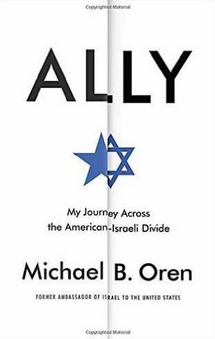I recently read “Ally: My Journey Across the American-Israeli Divide” by Michael B. Oren. The quotes I found most interesting are below. If you like the quotes, please buy the book here.
 “The Arabs were once dependent on American oil.” (39)
“The Arabs were once dependent on American oil.” (39)
“The single best American insight into the Middle East – by former Union Army General-in-Chief George McClellan, who in 1874 warned that the United States would never understand its peoples “so long as we judge them by the rules we are accustomed to apply to ourselves.” (40)
“Accustomed to leaders like McCain, crusty old soldiers and seasoned pols, Israelis could not understand why Americans would choose a candidate lacking in any military, administrative, or foreign policy experience. Overweight, short, bald or bespectacled candidates stand little chance in a U.S. presidential election, but Israelis readily voted for portly Ariel Sharon, diminutive Ehud Barak, and Menachem Begin, who was both follically and visually challenged. Americans prefer their presidents to be eloquent, attractive, and preferably strong-jawed. Such qualities, in the life-and-death stakes of Israel, are irrelevant.” (43)
“Unlike AMericans who salute rank – a policeman is always “officer,” and a former president is still “Mr. President” – Israelis salute the person. The commander of the IDF is not called “general” and the chief justice of the SUpreme Court is not “your Honor.” Rather, they are addressed by their first names and, more frequently, their nicknames. This informality, a vestige perhaps of the biblical contempt for kings or the time when Israel’s population was minuscule, removes the interpersonal barriers. But it also erases private space.” (73)
“On American television, naive characters often had a southern drawl – but naifs on Israeli TV frequently sound like Americans.” (73)
“Far more than achieving a historic peace, possibly winning the Nobel Prize, and guaranteeing his place in diplomatic history, Abbas wanted to remain in power and stay alive.” (81)
“America’s new policies set conditions for talks that Israel could never meet and that Palestinians could not ignore. For the first time in the history of the U.S.-Israel alliance, the White House denied the validity of a previous presidential commitment.” (81)
“Henry Wotton observed, “An ambassador is a man of virtue sent abroad to lie for his country.” (89)
“Vernon Jordan told me that Obama was not Israel’s chief problem. Rather it was America’s economic crisis, which showed scant sign of abating, and its retreat from global leadership.” (93)
“Abracadabra means ‘I speak therefore I create.’”
“From Obama’s autobiographical works arose the image of an individual who had overcome adversity early in life, who displayed resilience and contempt for weakness but also a cold-blooded need for control. Projecting that need, not surprisingly, made his administration the most centralized since World War II, with many key decisions made in the Oval Office.” (97)
“Perhaps, too, Obama’s rejection by not one but two Muslim father figures informed his outreach to Islam.” (98)
“Instinctively, human beings seek order in the universe and, in politics, a clear formula for decision making. In reality, though, randomness – whims, quirks, gaffes – determines much of the relations between individuals, just as it does among nations.” (98)
“Israelis, very few of whom own firearms, frequently asked me why Americans needed so many guns when they had such a powerful army. “They need guns to protect them from the army,” I explained.” (106)
“in America, less than half of a percent of the population volunteers for the armed forces.” (108)
“Most Jewish holidays, an old joke goes, can be reduced to nine words: “They tried to kill us. We survived. Let’s eat.” (120)
“Golda Meir said, “We Jews have a secret weapon, we have nowhere else to go.” (135)
“Israelis have difficulty understanding America’s missionizing zeal and the belief – hardwired into the nation’s identity – that the United states was created not only for its own good but for all of humanity’s.” (196)
“I once heard Obama say, “Mediating between Israelis and Palestinians is harder than mediating between Democrats and Republicans.” (207)
“The last thing I expected was to be accosted by a ninety-year-old Jewish woman whose head barely reached my belt. “I like you, but I don’t like everything your country does,” she growled.
“Excuse me, ma’am,” I courteously replied, “but do you like everything your country does?”
“No.” She wagged her finger in my face. “But your country must be perfect.” (254)
Liked the quotes? Click here to buy the book.

